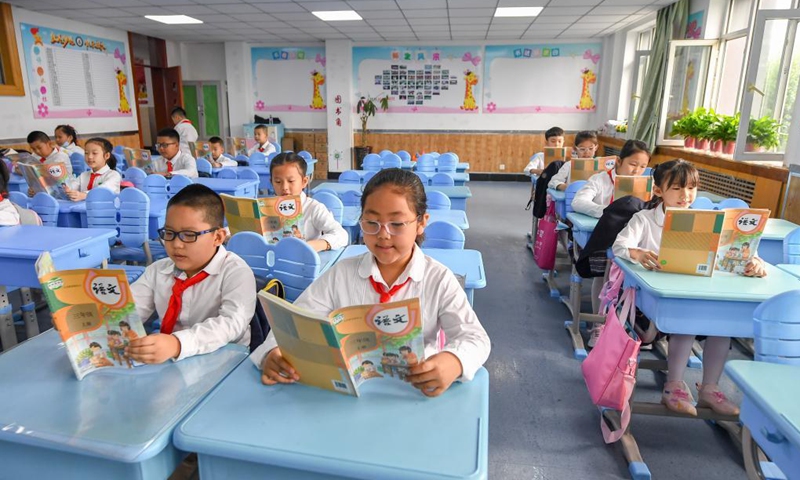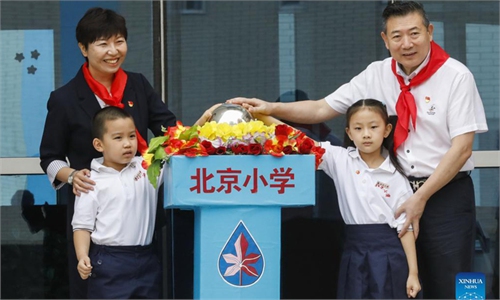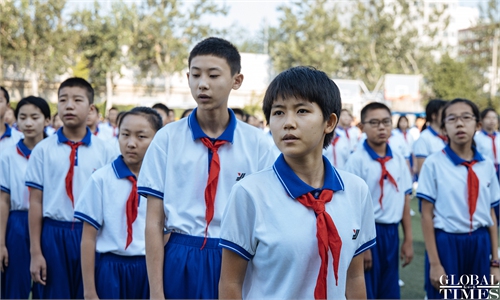Detailed regulations set to ease pressure for over 1.4 million students, thorough implementation expected

Primary students read in the morning session at a school in Changchun, capital of northeast China's Jilin Province, Aug. 23, 2021. Primary and middle schools in Changchun greeted their new semesters on Monday. (Xinhua/Zhang Nan)
Beijing on Tuesday issued detailed regulations to reduce burdens for students, including postponing morning class time, promising one hour for physical exercise and providing at least two-hour after-class services per day, in preparation for the new semester for about 1.4 million students in compulsory education.
Experts said that a thorough implementation of the measures would be key to the new round of educational reforms, following a notice released by the General Office of the Communist Party of China (CPC) Central Committee and the General Office of the State Council on July 24, in a bid to reduce students and parents' pressure on education.
Education authorities in Beijing have instructed schools not to organize tutoring for students during winter and summer holidays, weekends and other holidays.
In addition, schools should not ask parents to check homework or require students to check and correct their own homework, said Li Yi, deputy secretary of Beijing municipal education commission on Tuesday.
All schools in compulsory education stage, including private and public schools, should provide at least two hours of after-class services for all students per day from Monday to Friday, said the official.
Li also said that examination results should be presented in a hierarchical system.
An English teacher at a junior high school in Beijing, surnamed Chen, told the Global Times on Tuesday that they have already begun to adjust their grading systems according to the guidelines on subjects like music and arts, canceling specific scores and instead using grades in course assessment. Chen said that the school has also put much effort to ban off-campus tutoring.
In China, the pressure to outcompete others begins at an early age, from securing a place at a good kindergarten, getting into a "key school" to finding a place at an elite university. This has pushed many parents to send their children to attend various after-school training classes in order to get an edge on exams amid fierce competition.
The main purpose of extending after-school service hours in Beijing is to reduce the time for off-campus tutoring, in the hopes that parents who used to pick up their children from school and send them to tutoring institutions would now choose to let their kids stay on campus, Chu Zhaohui, a research fellow at the National Institute of Education Sciences, told the Global Times on Tuesday.
To ensure the quality of after-school activities, authorities should provide necessary capital support and think about how they can effectively motivate teachers to actively engage in the activities and increase teachers' income in this regard, Xiong Bingqi, director of 21st Century Education Research Institute in Beijing, told the Global Times.
A number of challenges still lie ahead, which mainly revolves around the relationship among teachers, students, and parents. Therefore, strengthening the communication among the three parties and setting up bottom lines would be crucial in implementing these measures, Chu said.
"After-school activities must be based on the situation in each school, and cannot be adopted in a one-size-fits-all manner. Authorities should also give more support in increasing benefits for teachers," Chu added.
There are regulations about banning rankings and no "key classes" in school, but some schools have been secretly violating rules under pressures from various fronts, which makes the strict supervision of schools particularly important, Xiong said.
'To bring a fundamental change in education, decision-makers should consider diversified evaluation systems instead of a single one, Xiong added.




